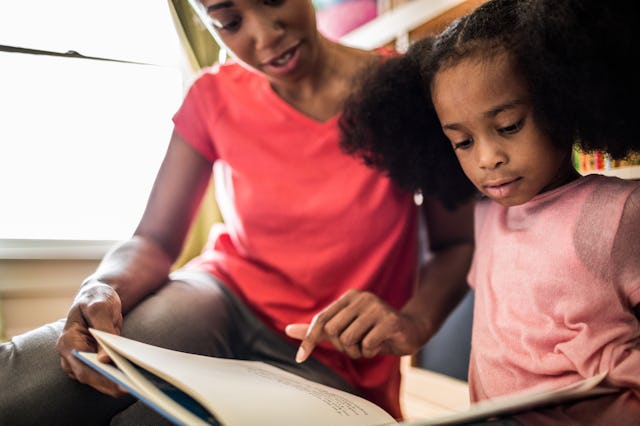God, Give Me The Patience To Survive The Early Reader Stage
Reading is so magical, so important — and sometimes, so excruciating to sit through.

Even if your childhood was devoid of the Reading Rainbow theme song or the thrill of a Scholastic Book Fair, you’ve almost certainly gotten the message that reading is essential, its benefits manifold. Parents are told constantly to read to their children right from the start, silly as it may feel to flip those pages before the glazed-over eyes of a newborn.
I am here for that. Bring on the comb, the brush, and even that bowl full of mush. Voices for heroes and villains? I’ve got them covered. I’ll read to these kids all day. It’s all dinosaur dances and bear hunts — right up until that to becomes a with. But reading with a child, or rather, mustering the patience of a saint to sit there while they stammer through the basic phonetics of early literacy? Well, that’s something different.
I’ve got two early readers at my house, plus one who we thought for a second might be a prodigiously literary toddler until we realized he’d just memorized the entirety of Sandra Boyton’s portfolio. He still has a few more years before sight words. The other ones are running their fingers along pages and sometimes sounding out words with such impossible longevity that I am certain they are just delaying bedtime. I need to say a serenity prayer: Grant me all your calm to survive the agony of sitting next to my precious child with his shower-wet hair neatly combed, as he stares at the word “bag,” and takes an eternity to say “buh” then “aaa” then “guh.” Give me the strength to stay quiet while he runs the sounds together, when he finally shouts BAG! and I must act surprised, nay thrilled, at the identification of the brown sack with handles.
It’s nice to remember that we do this for good reason. Reading with young children gives them better communication and speech skills, enhanced cultural understanding, and higher academic performance, just to name a few. Reading has been shown to bring about the health benefits of meditation, putting our brains into a pleasurable trance-like state. As for me, I’m sharpening my self-control skills. How many times must we read the same Black Panther book?
And then, when a new book enters the rotation, I lie there thinking that since the dog has fallen off his scooter twice now, this one must be the time he gets it. Surely, we are at the climax. I’m on the bottom bunk, head on a dinosaur pillow, trying to look convincingly interested — or even just awake — as my son holds a finger under the word celebrate, saying: “Calibrate? No, no don’t tell me,” trying not to think about the dark chocolate peanut butter cups awaiting me downstairs, or perhaps even a book of my own.
Of course, of course, these are moments to be cherished. I am grateful for my children’s developing minds, for their love of books and desire to read them. Stephen King called books “a uniquely portable magic.” And anyone who has ever experienced Max’s sailing into the night of his very own room, or Harry’s first run into the wall of Platform 9¾, or Jo March’s writing by candlelight in her attic, knows it to be true. To think of the worlds my children will discover in the backs of wardrobes and in the slopes of shires — that’ll keep me propping up my dinosaur pillow, nodding along, and when it’s getting really late, offering to read the next page (or five).
Hampton Williams Hofer lives in Raleigh, North Carolina, where she writes and raises babies. Her work has appeared in Flying South, Walter Magazine, Architectural Digest, and Food 52, among others. Family aside, her great loves are a South Carolina beach, a Roger Federer backhand, a Charlottesville lawn, and–most of all–a good story.